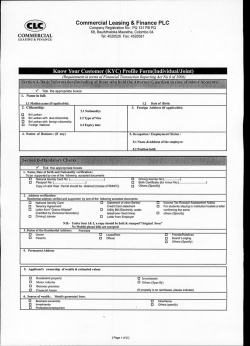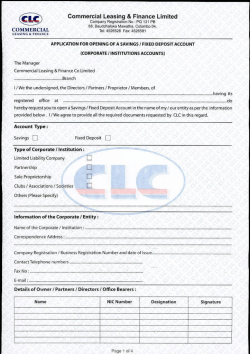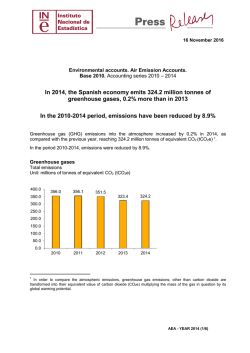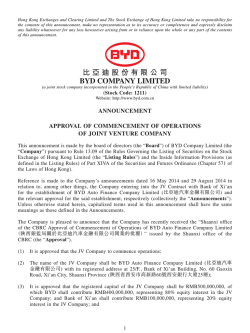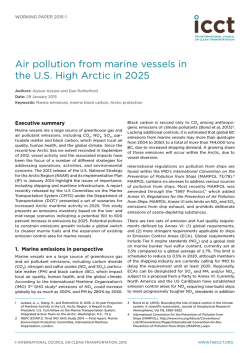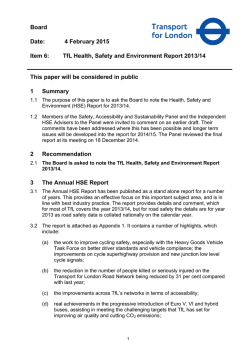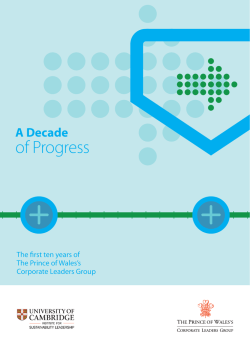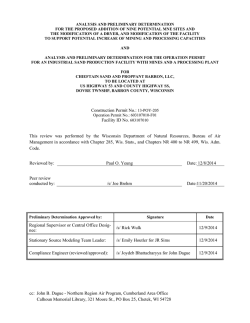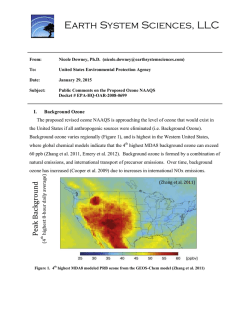
Better business driving
BUSINESS WISDOM Better business driving How to maximise vehicle efficiency and minimise your environmental impact In association with Business wisdom LESS TAXING Small businesses are discovering a more efficient way to finance business vehicles with Lex Autolease. Find out how leasing can be less taxing on your time, as well as your balance sheet. Get a quote today: CALL: 0800 012 1234 VISIT: LEASING4BUSINESS.CO.UK Driving green motoring forward With the roll-out of green legislation escalating as the EU’s 2020 emissions targets draw closer, businesses of all sizes are being urged to take environmental protection more seriously. By implementing environmentally focused policies to cut emissions, companies are not only ensuring regulatory compliance but significantly benefiting their bottom lines through improved efficiency, while addressing their ecological impact from a community and social perspective. In this supplement we explore how companies can embrace this eco-revolution and take advantage of new technologies to achieve tangible business benefits. In the fight to minimise environmental damage, the automotive industry has come to the fore. Progression in engine technologies, coupled with cost-effective options such as leasing, mean that compromises are not required when selecting vehicles. We take a close look at the options these advances provide for increasing efficiencies through lower petrol consumption, together with providing tips to reduce your motoring carbon footprint. I hope you enjoy the supplement and look forward to hearing your feedback. Simon Barter Head of SME Direct, Lex Autolease TREND REPORT: THE ENVIRONMENT MATTERS 4 Why motoring is undergoing its own eco-revolution, plus a look at four of the best green vehicles for business driving MAKING YOUR EXECUTIVE CAR PLANET-FRIENDLY 8 10 valuable tips on how to reduce the impact of your transport on the environment EVERYTHING YOU NEED TO KNOW ABOUT LEASING 10 10 frequently asked questions about leasing, and how Lex Autolease can help you with eco-friendly transport solutions Group editor Lysanne Currie Writer Christian Koch Chief sub-editor Robert Sly Creative director Chris Rowe Commercial sales director Jo McGraw Advertising manager Ben Hammond Marketing director Tom Christie-Miller Production manager Lisa Robertson Editorial 020 7766 8950 [email protected] Advertising 020 7766 8900 [email protected] Production 020 7766 8960 [email protected] Institute of Directors 020 7839 1233 www.iod.com Published by Director Publications Ltd for the Institute of Directors, 116 Pall Mall, London, SW1Y 5ED. Opinions expressed do not necessarily reflect IoD policy. The IoD accepts no responsibility for views expressed by contributors. FEBRUARY 2015 DIRECTOR 3 Business wisdom Petrol-powered engines are fighting back, thanks to better and more fuel-efficient turbos“ A greener road ahead S hort of using tyres made from hemp or converting your combustion engine to algae (not as strange as it seems – read on), drivers can often feel there is little more they can do to minimise the ecological impact of their motoring. Yes, there might be an ever-growing plethora of fuel-efficient cars on the market plus tax incentives aplenty, but many motorists suppose they need to summon superhuman levels of green halo-ness to reach forthcoming emissions targets (see the EU’s 2020 target of 95g of CO2 per km for a new car). Which isn’t great news for air quality campaigners – in the UK, transport accounts for nearly a quarter of greenhouse gas emissions, more than half of which comes from the humble car. Yet some great progress has been made in recent years. A 2014 report by the SMMT showed that CO2 4 Director Business wisdom emissions have fallen across every strata of cars, and executive cars in particular. Emissions from company motors in 2013 were lower than those from small city cars in 2010. The increasing popularity of diesel over the last decade also accounts for this CO2 cutback. Diesel-fuelled cars burn less fuel, therefore producing fewer grammes of CO2 per km than those powered by petrol. They’re also in demand. In 2010, sales of diesel cars overtook those of petrol for the first time, possibly aided by eco-friendly government legislation. Today, vehicles with high CO2 emissions are penalised by higher fuel duty tax, while diesels with the lowest CO2 emissions are exempt from road tax and congestion charges. (They also receive better insurance premiums too.) But petrol-powered engines appear to be fighting back, thanks to better turbos that make them more fuelefficient. Four years ago, diesel-fuelled cars from Lex produced 16 per cent fewer CO2 emissions per kilometre than petrol-fuelled cars. By 2013, this had dropped to seven per cent. Furthermore, a 2013 ministry report showed that diesel fumes were more damaging to health than petrol engines. The findings, published by the Department of Energy and Climate Change, found that diesel-related air pollution contributes to lung disease, heart attacks and asthma, costing the NHS more than 10 times as much as those problems caused by petrol fumes. Environmental issues are also being taken more seriously by employers. Recent research by Lex Autolease has shown that 45 per cent of managers have introduced environmentally focused policies in the last two years. Meanwhile, 42 per cent of fleet managers said I Once maligned as gas-guzzling eco-offenders, motorists are increasingly embracing greener ways of driving – both for business and personally – as research by Lex Autolease and the Society of Motor Manufacturers and Traders (SMMT) shows Business wisdom By 2020, green automotive technology may have radically changed the way we drive” they welcome the idea of rentals based on mileage, with 12 per cent saying they liked the idea of employee car clubs in city centres. Despite this burgeoning eco-awareness, popularity of electric vehicles and hybrids remains fairly debatable. Only two per cent of vehicles in Lex Autolease’s fleet (the company is responsible for one in every 33 new UK car/van registrations) is an electric car, reflecting national trends which show they account for 2.3 per cent of the market. However, SMMT statistics recently revealed that alternatively fuelled vehicles (AFVs) were up 59 per cent in October 2014, while electric carmakers Tesla delivered a record 7,785 sedans in the third quarter of last year. Incentives abound for electric, hybrid or AFVs, including government grants of up to £5,000 from the purchase price, exemption from London’s pricey congestion charge and benefit-in-kind taxation. This taxation can also be 6 Director Business wisdom advantageous for company cars, although Lex Autolease has found that it triggers confusion in many executive car drivers. Company car tax was reformed in 2002 to an emissions-based system, with the charge calculated by applying a percentage figure (determined by fuel type and CO2 emissions) to the list price of the car. If you own a cheap car and emit minimal CO2, you’re much less likely to find the taxman scary. Despite this, only 50 per cent of company car drivers surveyed knew that CO2 emissions were involved in calculating their tax bill. Furthermore, 45 per cent assumed their tax was evaluated by engine size and almost a quarter (23 per cent) believed it was affected by the make of car. One in seven even thought their tax was determined by family or friends driving the car. A slew of emissionsslashing policies will be ushered in during 2015. This September, the Euro 6 emissions standards for cars comes into force, while all large organisations need to complete their ESOS energy audit assessment by December – something which will no doubt please those 44 per cent of fleet managers who would like stricter emission standards. However, by 2020 (the European Commission’s CO2 emissions target year), green automotive technology may have radically changed the way we drive. Self-driving cars are due to hit British roads in early 2015, with cities such as Bristol, London, Coventry and Milton Keynes all hosting trials. A sports car (the QUANT e-Sportlimousine) that runs on saltwater was recently certified for use on EU roads. Then there’s the US firm Sapphire Energy, which produces algae-based crude oil, meaning algaepowered cars could soon be a reality too. However, there are already plenty of environmentally friendly transport options available, as our selection of green fleet vehicles shows here... FOUR OF THE BEST Four of the most efficient eco-friendly cars in Lex Autolease’s collection Mitsubishi Outlander This award-winning plug-in hybrid embraces new technology for the price of a diesel. Offering generous space, it’s a popular choice for an electric vehicle company car. Nissan Leaf Why has this pure electric car satisfied so many of Lex Autolease’s customers? Well, there’s the running costs of 2p per mile, along with the fact that it heats up instantaneously in winter (any ice on the glass dissolves in a matter of seconds). Meanwhile, every full charge gives you a range of 124 miles and there are zero emissions too. BMW i3 When it hit European showrooms in 2013, this funky four-seater was much lauded for its futuristic design, its onboard petrol generator (which increases vehicle range to 160 miles) and impressive CO2 emissions of 13g/km. Lex Autolease has two BMW i3 models in its collection – a pure electric i3 and the Extended-Range Electric Vehicle. Renault Zoe You’ve probably seen the TV adverts soundtracked by The Jam’s classic song That’s Entertainment. This 100 per cent electric car is particularly good for short journeys around town, such as shopping runs, with a range of 130 miles and no toxic tailpipe emissions. FEBRUARY 2015 DIRECTOR 7 Business wisdom CASE STUDY 10 tips for greener driving SAVING FUEL (AND MONEY) THROUGH LEX AUTOLEASE How Lex Autolease helped one engineering giant save £1m a year by reducing its fuel consumption How to reduce your vehicles’ impact on the environment and your bottom line TAKE A NEW APPROACH The average new car emits about 20 per cent fewer emissions than other cars currently on UK roads. The reason for this? Car manufacturers now consider meeting CO2 emissions targets as a core factor when determining the design of the motor. This probably accounts for CO2 emissions for new British cars falling from around 164.9g/km in 2007 to 128.3g/km last year*. To calculate fuel emissions for used and older cars, visit http://carfueldata.direct.gov.uk 2 CONSIDER GOING ELECTRIC With government incentives ranging from a 25 per cent grant to exemption from London’s congestion charge, there’s arguably never been a better time to purchase an electric car. Especially when cutting-edge vehicles such as Tesla’s Model S, the critically acclaimed Nissan Leaf, and BMW’s i3 battery electric have entered the market too. 8 Director Business wisdom 3 CAR-LEASE OR SHARE Drivers are increasingly realising that leasing cars is a greener (and more economical) way of driving, as the option provides access to vehicles with advanced green technology that may not have been affordable if bought outright. As automotive technology continues to reduce carbon emissions in new models, leasing provides drivers with access to the latest technology with new vehicle models available upon contract renewal. 4 CONVERT TO VEGETABLE OIL As well as being useful for breakfast fry-ups, making roast potatoes and baking cakes, cooking oil can also make you drive more efficiently too, with zero net CO2 emissions (or so its supporters claim). UK-based enterprise Veg Oil Motoring (www.vegoilmotoring.com) can convert your vehicle to run on the biofuel from around £1,200. 5 EMPLOY ‘HYPERMILING’ 6 Driving at lower revs automatically slashes fuel consumption so change up a gear at around 2,500 revs in a petrol car or, alternatively, 2,000 revs in a diesel vehicle. ABANDON AIR CON 8 DON’T ‘IDLE’ THE ENGINE 9 LIGHTEN YOUR LOAD Idling the engine can increase emissions by 13 per cent. To prevent this needless fuel waste, where possible drive away as soon as the engine starts. Hypermiling (aka eco driving) is the practice of driving your car so it delivers better fuel economy. By driving a little more slowly (decreasing speeds from 75mph to 65mph, say), avoiding sharp acceleration and limiting braking, it’s estimated that road users can drastically reduce their fuel emissions. See the RAC’s Easy on the Gas report for more (www.racfoundation.org) GEAR UP 7 Air conditioning increases fuel use at all speeds. If travelling at low speeds (less than 40mph), open the windows instead – it’ll save you more. Excessive weight such as roof racks and boxes increase both drag and fuel costs. By removing them, motorists can save as much as 20 per cent on fuel costs. *2014 NEW CAR CO2 REPORT, SMMT 1 10 TAKE AN ECODRIVING COURSE At the Institute of Advanced Motorists’ (IAM) Ecolution lessons, you’ll learn how to save fuel through some ‘defensive driving’ techniques. Visit www.iam.org.uk/eco German industrial group Siemens is one of the world’s largest engineering and electronics firms. In the UK, it employs nearly 14,000 people and has a fleet of 4,500 vehicles (of which 3,500 are cars and 1,000 are commercial vehicles). Siemens wanted to reduce the cost of running this fleet, plus improve service delivery to consumers. But how could it achieve this while adhering to its sustainability agenda? Siemens asked Lex Autolease to look at how things could be done differently within its light commercial vehicle fleet. This wasn’t just a matter of looking at direct costs such as fuel and leasing, but also indirect factors such as productivity being affected by having the wrong vehicle visit remote sites in bad weather. Taking a holistic stance, Siemens consulted workers across the business. The upshot was that the fleet now employs a narrower range of vehicles. To accommodate changes in working practice, there was also a significant downsizing of vans too. As a result, fuel consumption has been reduced, leasing costs have been lowered, while vehicle utilisation has improved, with Siemens making substantial savings over the lifetime of running the vehicle. “Lex Autolease asked us some searching questions, which led us to question what we did and how we worked,” says Paul Tate, commodity manager at Siemens. “Involving people from around the business, on a consensual basis, enabled us to ensure that these sometimes radical changes to vehicles and working practices were more readily accepted by the business. I would advise people not to be afraid to ask for outside help and to work with suppliers in partnership.” FEBRUARY 2015 DIRECTOR 9 Business wisdom All you need to know You can save money by leasing lower-emission vehicles” Want to find out more about cashflow-friendly leasing? Lex Autolease has the answers ■ WHO IS LEX AUTOLEASE? The UK’s largest vehicleleasing business, responsible for one in every 33 new car and van registrations made nationwide. Having bolstered British business since 1958 by leasing company cars, Lex Autolease manages over 280,000 vehicles, assisting over 6,000 home-grown enterprises in the process. ■ HOW CAN SMES BENEFIT FROM LEASING? Leasing gives you better control of your finances. You can budget around fixed monthly costs with no hidden surprises or risk of depreciation. Drive a brand new car or van of your choice with optional servicing and maintenance, road tax, breakdown cover and tyres included. ■ WHAT FINANCIAL SAVINGS ARE THERE? Monthly lease payments are typically cheaper than 10 DIRECTOR FEBRUARY 2015 even has a dedicated ‘green’ team, which can give you an environmental analysis of your fleet, dispense practical advice on improving your eco performance, as well as suggesting how your company’s cars can reduce their mileage. repaying car loans, so your cashflow is likely to be boosted as a result. Indeed, it’s estimated that the average SME-owned vehicle depreciated by more than £10,000 over eight years, the average age of LCVs in the UK. SMEs are missing out on growth opportunities because they have almost £6.7bn tied up in commercial vehicles sitting on their balance sheets as a depreciating asset. ■ HOW DOES LEASING CARS WITH LEX AUTOLEASE WORK? ■ WHAT ARE THE CO2 EMISSIONS OF LEX AUTOLEASE CUSTOMERS' VEHICLES? The average CO2 of Lex Autolease’s car fleet is 123.8g/km – an improvement on 2012, when it was 140g/km. ■ DOES LEX AUTOLEASE OFFER ECO-FRIENDLY CARS? It has 4,391 hybrid vehicles, which includes a plug-in fleet of more than 700 vehicles. These span plug-in hybrids, extended-range electric vehicles, plus Renault Zoe and Kangoo ZE electric vehicles, both on contract hire. ■ AREN’T LOWER-EMISSION CARS GENERALLY MORE EXPENSIVE? Not at all. By leasing lower emission vehicles, you can actually save yourself some money. As well as a more economical fuel bill and road tax, you’ll have less company car tax to pay too. This company car tax is calculated by multiplying the car price by five to 35 per cent (depending on the car’s CO2 emissions). Plus, cars with zero emissions (such as electric cars) aren’t taxed at all. ■ DOES LEX AUTOLEASE PROVIDE ANY OTHER ‘GREEN’ SERVICES? A pioneer of ‘green’ fleet solutions, Lex Autolease has a vast repository of hands-on experience and expertise. It Leasing a car from Lex Autolease couldn’t be easier. All you need to do is check the prices and vehicles at leasing4business.co.uk, then select your vehicle, mileage and contract period (which lasts from two to five years). Afterwards, Lex Autolease will supply a quote. After credit approval, the company will order your vehicle before delivering it to your door. ■ WHERE CAN I FIND OUT MORE ABOUT LEASING? Discover more at leasing4business.co.uk or call 0800 012 1234. FEBRUARY 2015 DIRECTOR 11 BUSINESS IS LOOKING GOOD Talk to Lex Autolease about how your business can benefit from better vehicles for less than you may think. Get a quote today: CALL: 0800 012 1234 VISIT: LEASING4BUSINESS.CO.UK
© Copyright 2026
